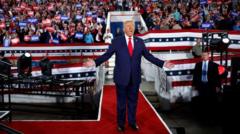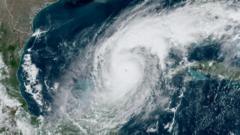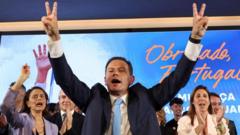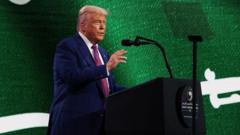Experts warn that Trump's presidency poses an immediate risk to international climate agreements, with potential long-term effects that remain uncertain. His climate skepticism and previous actions have raised concerns among climate advocates.
Trump's Election Seen as Significant Hindrance to Climate Initiatives

Trump's Election Seen as Significant Hindrance to Climate Initiatives
The re-election of Donald Trump is anticipated to negatively affect climate action both domestically and globally, particularly with the upcoming UN climate talks looming.
With his recent victory in the presidential election, Donald Trump's return to the White House is expected to critically hinder worldwide climate change efforts, especially on the eve of the COP29 negotiations. Experts assert that his climate denial stance and plans to focus on oil and gas exploration will derail progress in curbing greenhouse gas emissions.
Although climate issues were minimally discussed during the campaign, Trump's proactive policies could significantly influence US participation in international agreements. Critics foresee that if he withdraws the US from the Paris Agreement, it would be astoundingly swift, as he would only need a year before removing the nation from the accord. This scenario could hamper cooperation with countries like China in future climate negotiations and limit the capacity of the US to fund climate initiatives in developing nations.
Richard Klein, a climate policy specialist, articulated a dismal outlook for upcoming climate summits, stating, "The US at this COP is not just a lame duck; it's a dead duck." Without existing commitments, the prospect for ambitious international cooperation diminishes, particularly given the necessity for wealthier nations to increase financial support for those adversely affected by climate change.
Despite the US's potentially quick exit from the Paris Agreement, Trump will remain constrained by other international frameworks—though some within his circle are pushing for a complete withdrawal from global climate initiatives. This suggests a troubling trend towards isolationism in climate policy, which has been long-supported via bipartisan historical agreements.
The anticipated pro-fossil fuel policies under Trump may also lead to the cancellation of significant renewable energy projects, intensifying concerns regarding climate change. While there is enthusiasm for natural gas and oil exploration, the extent to which it will impede green technologies remains to be seen. Even within Republican areas that benefited from Biden's Inflation Reduction Act—which directed resources towards renewable energy—there may be pushback against any drastic shift in focus.
Despite acknowledging the setback, some climate leaders remain optimistic about the ongoing transition towards sustainable energy solutions. The former UN climate chief, Christiana Figueres, asserted that while Trump's presidency could act as a setback, the march towards decarbonization is already underway and cannot simply be reversed. The foundational shift towards green energy investment may continue to flourish independently of US leadership, signaling potential resilience in global climate action efforts.
Although climate issues were minimally discussed during the campaign, Trump's proactive policies could significantly influence US participation in international agreements. Critics foresee that if he withdraws the US from the Paris Agreement, it would be astoundingly swift, as he would only need a year before removing the nation from the accord. This scenario could hamper cooperation with countries like China in future climate negotiations and limit the capacity of the US to fund climate initiatives in developing nations.
Richard Klein, a climate policy specialist, articulated a dismal outlook for upcoming climate summits, stating, "The US at this COP is not just a lame duck; it's a dead duck." Without existing commitments, the prospect for ambitious international cooperation diminishes, particularly given the necessity for wealthier nations to increase financial support for those adversely affected by climate change.
Despite the US's potentially quick exit from the Paris Agreement, Trump will remain constrained by other international frameworks—though some within his circle are pushing for a complete withdrawal from global climate initiatives. This suggests a troubling trend towards isolationism in climate policy, which has been long-supported via bipartisan historical agreements.
The anticipated pro-fossil fuel policies under Trump may also lead to the cancellation of significant renewable energy projects, intensifying concerns regarding climate change. While there is enthusiasm for natural gas and oil exploration, the extent to which it will impede green technologies remains to be seen. Even within Republican areas that benefited from Biden's Inflation Reduction Act—which directed resources towards renewable energy—there may be pushback against any drastic shift in focus.
Despite acknowledging the setback, some climate leaders remain optimistic about the ongoing transition towards sustainable energy solutions. The former UN climate chief, Christiana Figueres, asserted that while Trump's presidency could act as a setback, the march towards decarbonization is already underway and cannot simply be reversed. The foundational shift towards green energy investment may continue to flourish independently of US leadership, signaling potential resilience in global climate action efforts.





















